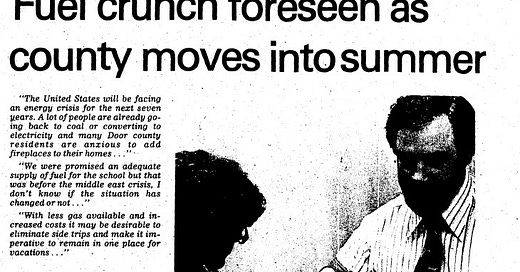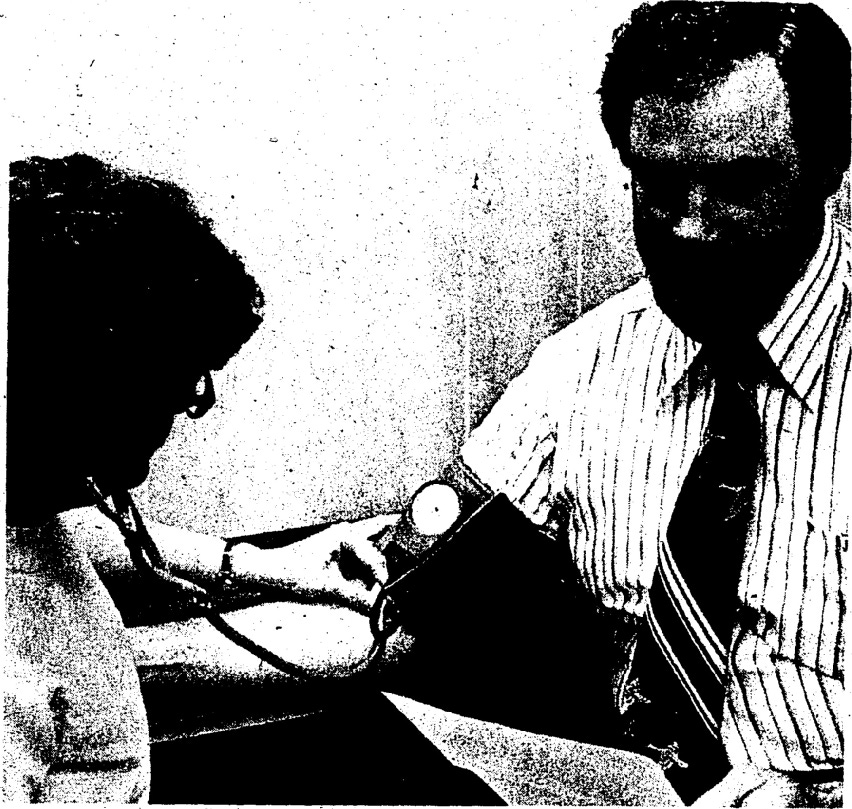“Fuel crunch foreseen as county moves into summer” from the May 15, 1979 Door County Advocate
Fuel crunch foreseen as county moves into summer
“The United States will be facing an energy crisis for the next seven years. A lot of people are already going back to coal or converting to electricity and many Door county residents are anxious to add fireplaces to their homes . . .”
“We were promised an adequate supply of fuel for the school but that was before the middle east crisis, I don’t know if the situation has changed or not . . .”
“With less gas available and increased costs it may be desirable to eliminate side trips and make it imperative to remain in one place for vacations. . .”
By LINDA ADAMS
This week’s coffee shop chatter on the energy crisis? No. These predictions appeared in the Advocate, in November of 1973 and probably not even the seers who made them can believe their prophecies would be relived again in less than a decade.
The first quote is from the late Carnie Seiler, former civil defense administrator; the second speaker was Southern Door School Administrator Lloyd Jilot and the third was John Alward, owner of the Chanticleer Inn at Eagle River. Each of these statements could have been spoken on May 15, 1979.
The energy crisis of 1973-74 — long, frustrating lines at the gas pumps, closed stations, heating oil shortages and soaring fuel prices are all happening again for the second time in six years. Economists on a national level maintain that while the nation has not yet reached a crisis, compared to six years ago the energy crunch is potentially more dangerous.
“It’s hurting me. I’m not half through the month of May and I’ve already pumped 50 percent of my allocation for the month,” Joe Martorano, owner and manager of Joe’s Bay Standard told the Advocate Monday morning.
“I closed down Saturday afternoon and all day Sunday for the first time. I’m only getting 20 percent of the allocation I received last year and I don’t know how long it will last.”
Gasoline wholesaler Vivian Muckian, vice president and secretary of Muckian Oil Co. estimates her allocation has been cut between 10 and 15 percent. She and her husband own five gas stations and she says she hasn’t cut back on allocations to the stations yet but she doesn’t know what is in sight.
“The biggest problem is with fuel oil for homes,” she said Monday. “We haven’t had to place any homes on allocation but we’re lucky warm weather is coming.”
“We aren’t taking on any new oil accounts,” Charles Weigand of Weigand Oil Co. reports. “We are only getting 80 per cent of last year’s usage and we expect trouble.”
Weigand says he plans to close the service station he owns on Sundays and may possibly shut down on Saturdays too.
“We just don’t have the fuel and there is no way to buy it — no matter how much it costs. If you think it’s bad now wait until next year.”
Regarding the home heating oil shortage, Weigand warned consumers to start conserving now. “If we can only get 80 per cent of the fuel we need the customers are only going to get 80 per cent of their needs and that’s the long and short of it,” he warns.
Mayor Dan Nielsen had his blood pressure taken by Mary Lindhorst, public health nurse, as he checked his proclamation asking others to do likewise.
“The public has got to realize that there is a real crisis,” maintains William Lawrie, gasoline wholesaler and fuel oil distributor.
Lawrie has already been cut back 20 percent on his allocations and anticipates he might be cut even further in the future.
“The priorities are set by the government,” Lawrie pointed out. “People don’t realize that farmers must first be given 100 per cent of their current requirements and then areas like schools, service crews, telephone companies and others must have their needs met before we can give gas to the service stations.”
According to Lawrie, his suppliers have been warning of the impending situation for several months and telling him to start building inventories. Lawrie’s problem is that it is difficult for a small company like his to meet the expense of building inventories; first, because he doesn’t have the storage tanks and second, because of the overhead cost involved.
“The public thinks that gasoline and oil dealers are really making a killing because of the rise in the price of gas at the pumps. That is not true,” Lawrie contends, “you have to look at the replacement costs. It’s going to get to the point very soon where you can’t replace the product for what you are selling it for.
While dealers here are warning their customers to start conserving, polls show that not only in Door county but nationally people are reluctant to believe there is a crisis. A poll last year revealed that only 33 percent of those interviewed thought the energy situation was serious.
A recent national survey by the American Automobile Assn. of 4,200 gas stations showed that about 15 per cent have already instituted their own rationing program because of supply problems. Thirteen per cent are closing earlier on weekdays and three per cent are limiting purchases by either gallon or dollar amounts.
Ruth Clusen, assistant secretary of energy, speaking to Wisconsin Press Women in Green Bay last Saturday, warned there is a real shortage, not just a manufactured crisis.
“You have to believe there is a serious problem and it will even reach Green Bay and surrounding areas,” she said.
Mrs. Clusen sharply criticized Congress for its defeat of the President’s request for authority to develop a standby plan for gas rationing.
She predicted that the four members of the Wisconsin delegation as well as others in Congress will be sorry for voting against the plan. “We will see the results of their vote in the months to come,” she said, “when long lines at stations, earlier closings and weekend closings will be common.”
The author of a recent energy article in the May issue of “Nation’s Business” asserted that “Until the public believes there is an energy crisis, it is unrealistic to think that elected officials are going to put their political futures on the line by voting for unpopular pieces of legislation.”
On the local level, Lawrie predicts that people in Door county will start feeling the crunch by the end of the month.
“The first problems will come Memorial Day weekend when half of the stations in Door county will have to close because they have no gas,” says Lawrie. “Then people here will believe there is trouble. Farmers have to have their gas first and most of them haven’t even been able to get onto the fields yet.”
Weigand advises residents here who are sincere about finding a solution to start writing to their legislators to find out why the problem isn’t being cured.
The one dissenter of the few gasoline managers contacted is Jae Straubel, manager of the Clark station on Michigan Ave. “My personal feelings are that when the price of gasoline reaches $1 a gallon we won’t have any shortage. If there really is a shortage,” Straubel questions, “why don’t they put a carburetor on the market that can get 50 miles to a gallon?”
Straubel’s allocation was cut last month and again this month after a closing of the bridge contributed to a drop in sales at his station and he fears he may not be able to get back that extra amount after the bridge reopens.
Nationally, energy experts agree that industry has already demonstrated that it can meet the challenge of conservation but the public has not.
In the same article in “Nation’s Business” one economist maintained that “Iran could turn out to be a blessing if it jolts people into realizing how precarious the energy situation really is. Obviously this country needs to have a near-crisis to put the fear of God in people before they will act.
“The Iranian disruption has sounded another loud warning to the U.S. The critical question is: Is anybody listening.”
As Mrs. Clusen summed it up in her speech Saturday, “You will have to decide whether to be cold next winter or drive to your cabins every weekend this summer?”
Or as last week’s Time magazine asked in its heading on a story about the upcoming crisis, “Drive now, freeze later?”
Courtesy of the Door County Library Newspaper Archive
Articles by Linda Adams
https://doorcounty.substack.com/t/linda-adams




